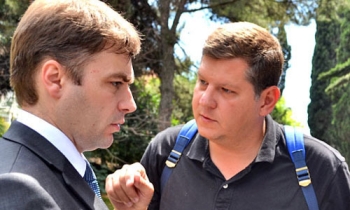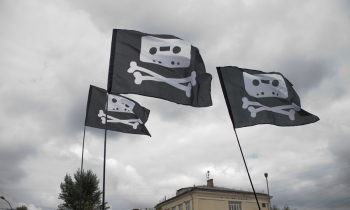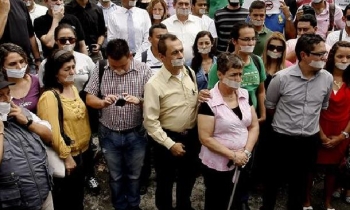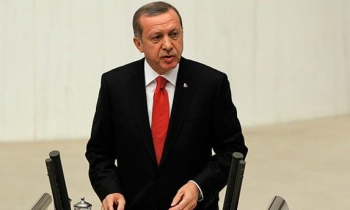KEHL AM RHEIN, Germany, Feb. 15 (UPI) -- Germany may have a cartoon scandal of its own after a caricature in a Berlin newspaper provoked hate mail and even death threats for the caricaturist.
The German daily Tagesspiegel last Friday published a caricature by artist Klaus Stuttmann, who attempted the German conservatives' eagerness to use army soldiers to safeguard the upcoming FIFA Soccer World Cup, which is expected to draw some 2 million soccer fans from all over the world this summer.
The cartoon featured four heavily armed Bundeswehr soldiers standing next to four Iranian soccer players equipped with explosive belts. The caption read: "Why the German Army absolutely needs to be deployed to the world cup."
The cartoon drew immediate angry reactions in Iran and in Germany.
In Tehran, some 50 protesters threw stones and Molotov cocktails at the German embassy. The guestbook of Stuttmann's website was soon flooded with several hundred messages. Some of them simply critiqued what they feel is a tasteless drawing.
"I am Muslim and half Iranian," a man called 'Amir' writes. "I think your drawing is not good. I don't repress women, nor am I a terrorist or do I have a beard. Every day I am discriminated against and this drawing doesn't help in that respect, much to the contrary."
But others were less balanced. Someone who called himself 'Bin Laden' wrote: "May your family somewhere in their vacation be ripped apart by a bomb so you know how it is if you make fun of such things...some wish for your death. I would happily execute you."
Several protest mails were in English, which suggests that the cartoon was distributed via Internet. So was Stuttmann's email address, which could be found soon on www.persianfootball.com, a site dedicated to Iranian soccer fans.
Stuttmann has since moved out of his apartment and is protected by federal police. He has apologized via his website for having hurt Iranians; however he made clear that the intention was simply to use irony to show that it was indeed NOT necessary to deploy armed troops.
The drawing meant to mock members of German Chancellor Angela Merkel's conservatives, who have relentlessly tried to come up with reasons to change the constitution to allow the army to safeguard stadiums, airports and embassies during the month-long tournament. Pre-emptive domestic deployment is illegal according to the constitution.
However, the irony did not seem to strike the hundreds of people who protested against equating Iran's soccer team with terrorists.
The Tagesspiegel also received several hundred pieces of protest mail, many obviously reflecting a deeply hurt sense of national pride. The Berlin-based daily published an editorial pledging allegiance to the cartoonist, signed by several journalists.
"Is it now no longer allowed to caricature the Iranian soccer team because we have to fear for our safety?" the editorial asked, adding that several radical circles had willingly misinterpreted the cartoon to fuel the ongoing standoff between the West and the Muslim world.
The Iranian embassy has written a letter to the Tagesspiegel's editorial department, demanding an apology. The German Society for Professional Journalists, DJV, feels such a move hampers with Germany's press freedom.
"If the embassy of a foreign country asks for a correction of a published piece, then that is the concerted attempt to curtail our press, and we are strongly condemning such a measure," Hendrik Zoerner, spokesman for the DJV, on Wednesday told United Press International. "A journalist shouldn't have to think twice before he writes or draws something. That would lead to self-censorship."
The latest spat in Germany reflects how tense feelings on both sides of the trench are: Stuttmann's guestbook also featured anti-Muslim messages, with several ones mocking the hurt feelings.
And it remains to be discussed if this was the only way to mock the conservatives.
"I think each journalist and each cartoonist should be very careful not to further fuel this conflict," Jo Groebel, director of the European Institute for the Media, a think tank researching developments in the European media, based in Dortmund, told UPI.
For Stuttmann, the angry reactions came as a surprise.
"So far I didn't have issues to draw the Iranian president," he earlier this week told the Tagesspiegel. "But at the moment I am having mixed feelings. You learn how unprotected you are."









